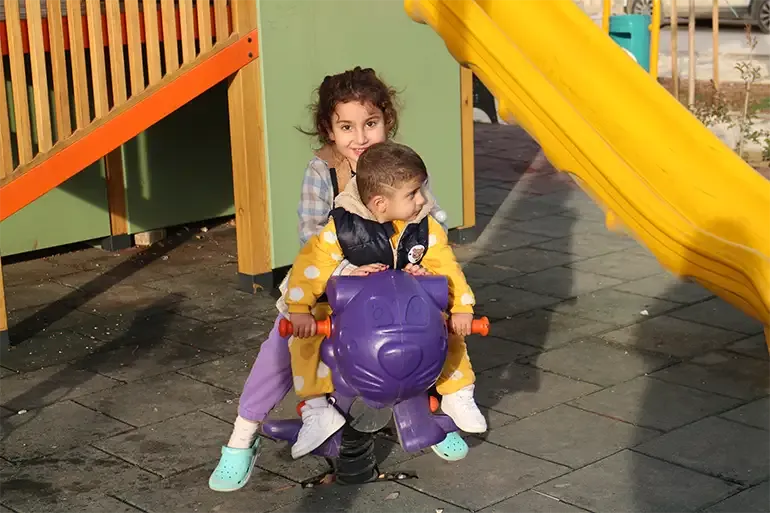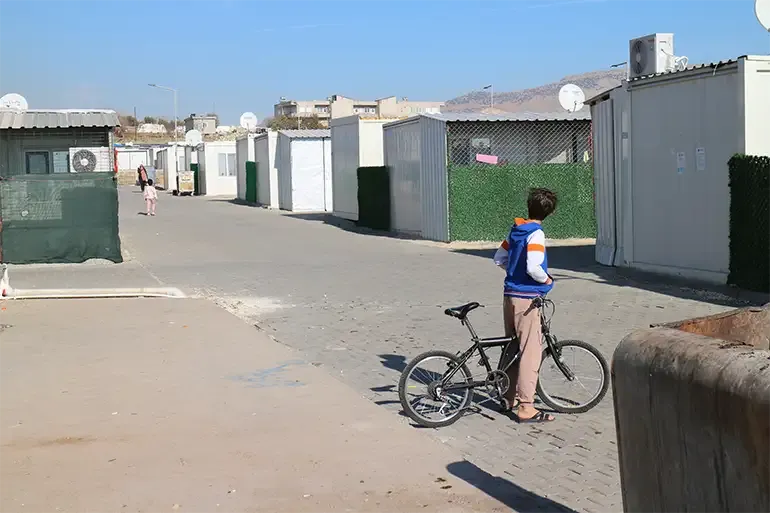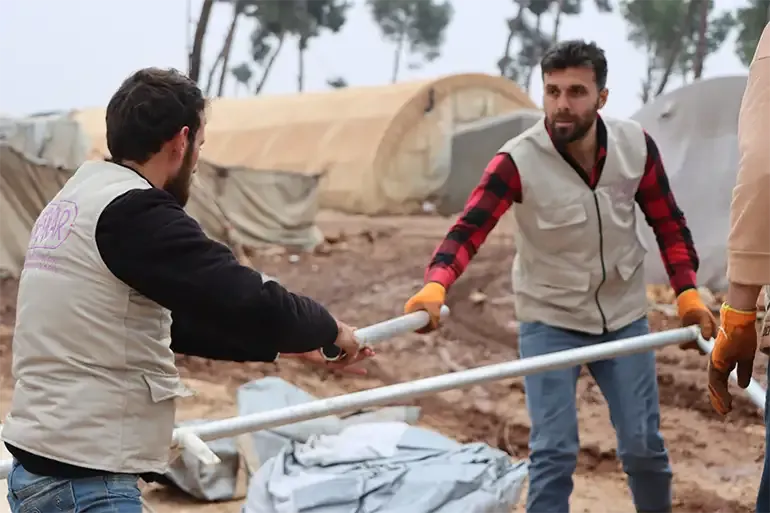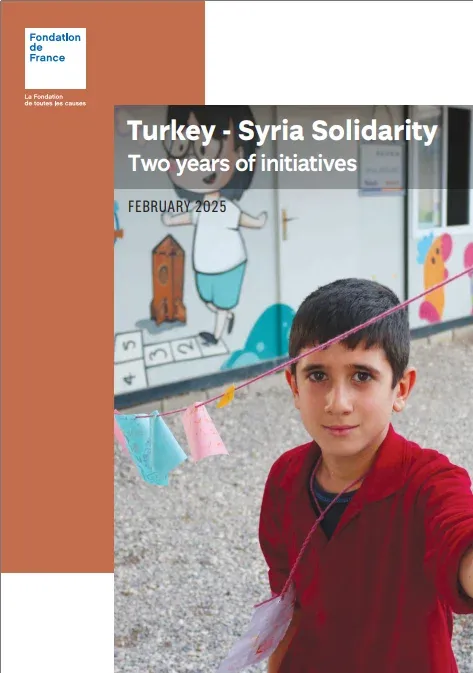Solidarity with Turkey and Syria: two years of initiatives
Southern Turkey and northern Syria were hit by two devastating earthquakes on 6 February 2023, killing more than 50,000 people and leaving hundreds of thousands injured and homeless. Two years after the disaster, Fondation de France remains fully mobilised to meet the needs of the people affected, which are still considerable. €9 million has already been earmarked for 88 initiatives in the affected areas.
An initiative strategy tailored to each region’s specific challenges
In southern Turkey, the earthquakes affected 10 provinces where 15 million people live, including 1.7 million Syrian refugees under temporary protection. Despite the significant mobilisation of the authorities and the population, support for civil organisations, particularly those working for the rights and assistance of minorities, remains essential. In Syria, already ravaged by 12 years of war, the north-west of the territory struck by the earthquake is divided among various actors (Damascus government, Turkish forces, rebel forces). This region, home to over 4 million people, faces major humanitarian challenges against a backdrop of fragile security and fragmented governance. Support is provided mainly by experienced local organisations. Faced with these different local challenges, Fondation de France’s intervention strategy has four objectives: meet the needs of disaster-stricken populations, support marginalised groups, encourage inclusive and sustainable initiatives and promote local know-how.
In Turkey: supporting the most vulnerable populations
At a time when hundreds of thousands of people have lost their homes and remain particularly destitute, Fondation de France is focusing its support on helping the most vulnerable populations, who are often marginalised and deprived of access to aid, particularly people with disabilities, women, children, the elderly, refugees and LGBTI+ people.
In the city of Samandag, the Emergency Architects Foundation has rehabilitated seven collective buildings, including several textile industry cooperatives employing exclusively women, a school for around one hundred pupils and a psychological care centre. It has also equipped these cooperatives with solar panels and industrial equipment, and a greenhouse has been built to enable vegetables to be sold.
In the city of Adıyaman, where 80% of the 600,000 inhabitants were affected by the earthquake, the FISA association provides psychological and educational care for children. Parent/child therapy sessions supervised by psychologists as well as educational and creative workshops (drawing, singing, dancing, etc.) are provided every day at the association’s premises. FISA is also committed to combating child labour, which has become particularly prevalent since the earthquake, by providing legal support with a dedicated team of experts. Thanks to support from Fondation de France, an open-air activity park near three school centres has been built, providing children with a safe place to play and socialise.
 In the city of Adıyaman, children enjoy the activity.
In the city of Adıyaman, children enjoy the activity.
The Shuder association, which brings together several associations of social workers, has been combating poverty in Turkey since 1987. In Adıyaman, it has built a village of 1,200 containers to house more than 7,000 disaster victims. The majority of them are Kurdish or Roma minorities, who are particularly excluded. The village has a doctor’s surgery, where a doctor and a psychologist see local residents. Social workers are also on hand to help with administrative and legal formalities and to raise awareness about violence against women.
 In the container village built by the Shuder association in Adiyaman.
In the container village built by the Shuder association in Adiyaman.
The NGO KAMER has built a life centre in Adıyaman to provide women and children from the region with a safe space to work in, as well as sanitary facilities. The centre offers women psychological support (oneto-one sessions with psychologists) and medical, legal and administrative support, as well as acting as an intermediary with the public authorities. Professionals also assist them in finding a new income-generating activity. There is a play area and educational activities for children. A similar centre has been set up in Hatay for women and children with disabilities. Nearly a million women and children have already benefited from the support of these structures.
In Hatay province, the NGO Handicap International and its local partners, supported by Fondation de France and AFD, are responding to the medical and psychosocial needs of the population. Medical services include rehabilitation sessions, medical assistive devices, psychosocial support, physiotherapy, mental health awareness sessions and therapeutic workshops to combat psycho-traumatic disorders. The NGO also helps the local population, particularly people with disabilities, to access local social services.
In Syria: meeting basic needs and healing bodies and minds
While hundreds of thousands of people remain homeless and destitute, access to basic needs remains a priority. Fondation de France supports projects to purchase and distribute basic necessities. In the city of Idlib, an NGO* is working in the refugee camps to improve their living conditions, particularly those of around 50 visually impaired women in precarious situations: fuel for heating, tents, solar panels and materials to protect them from the cold, rain and snow. In Afrin, the NGO is supporting 435 families, or around 2,500 people, living in very difficult conditions in tents and damaged buildings. It has installed 30 insulated tents and 50 solar units to provide hot water and electricity.
 In the city of Afrin, a Syrian NGO* is setting up tents in the refugee camps.
In the city of Afrin, a Syrian NGO* is setting up tents in the refugee camps.
In Aleppo, another NGO* is supporting 150 displaced children affected by the earthquake, ensuring that they are sheltered with their families and receive supplies (tents, heaters, warm clothing) to face the winter. The NGO has also built secure, heated learning spaces so that the children can continue their education. They also receive psychosocial support.
Access to drinking water remains difficult in many regions. In the Sheran sub-district for example, an NGO* has rehabilitated a well to supply 39 villages. This initiative not only reduces pressure on other existing water sources, but also the waiting time for water to be collected and distributed by tanker, while ensuring sustainable and safe access to this essential resource.
Health needs are also immense. Nearly a third of the population in the north-westis thought to be disabled as a result of the war and earthquakes. Hospitals in this region of Syria are continuing to see a massive influx of people injured in the earthquake, with many medical staff having disappeared following the disaster. In addition, the trauma caused by these events requires appropriate psychological care. In the Al-Kamouneh refugee camp, an association* supports 85 particularly vulnerable children, some of whom are orphans or separated from their families. The association has built a centre to shelter them and provide them with basic necessities. These children receive educational support from professionals, personalised psychological support and medical care, particularly the children with disabilities. The association is also working to reunite families.
*These associations cannot be named for security reasons.
Photo credits: © Léa Lacheteau
TO FIND OUT MORE
→ Turkey-Syria: ten months of action where it really matters
→ Emergencies: rebuilding lives over the long term


